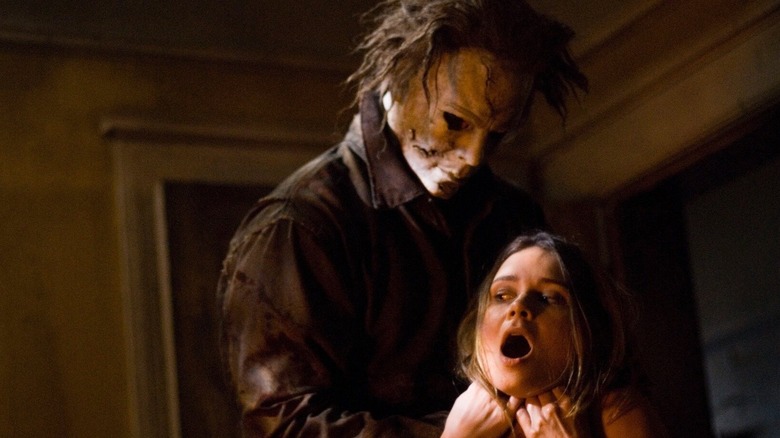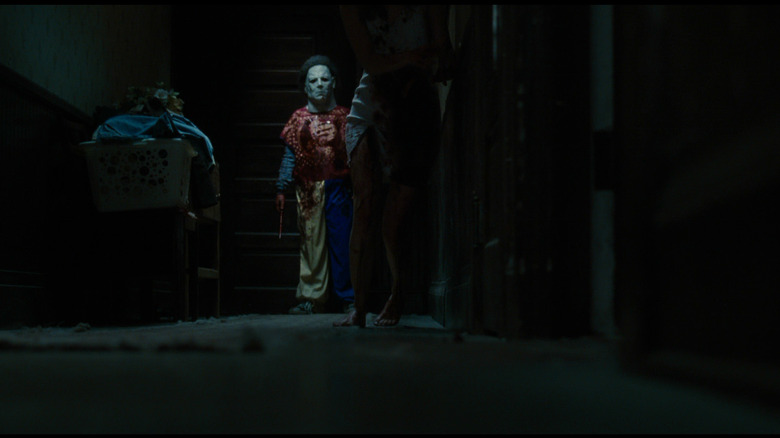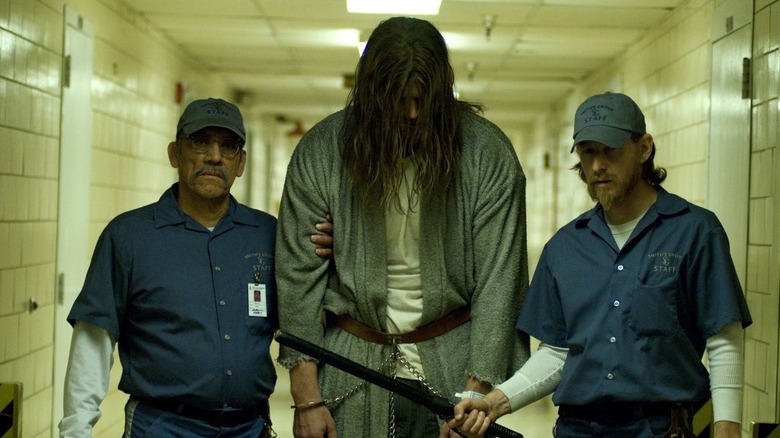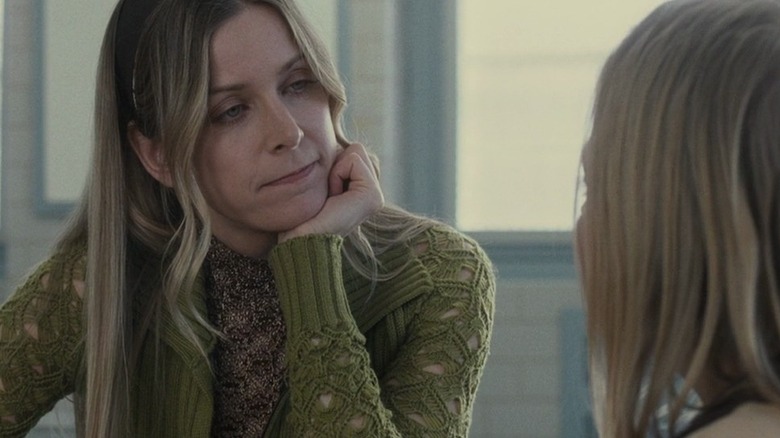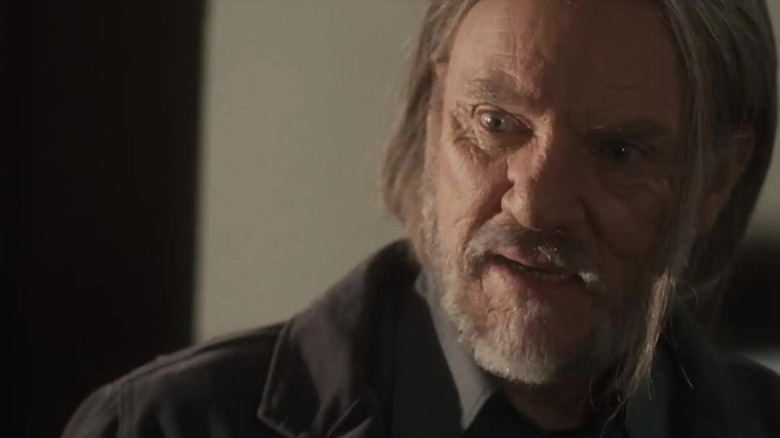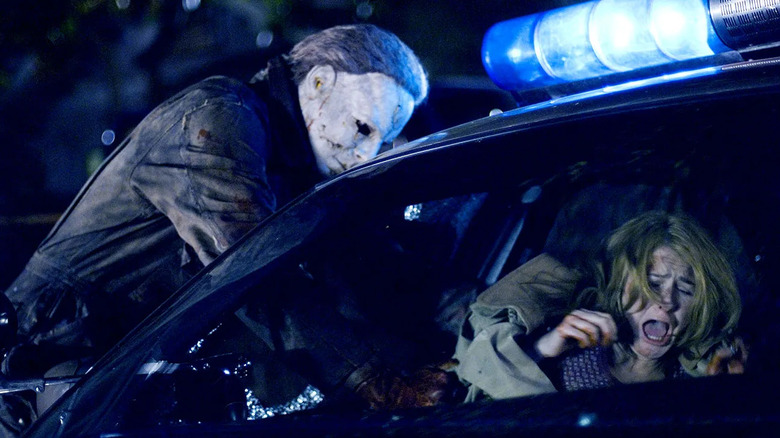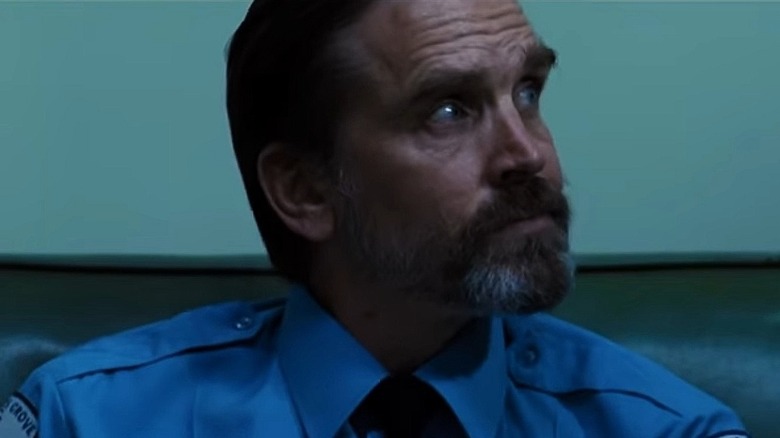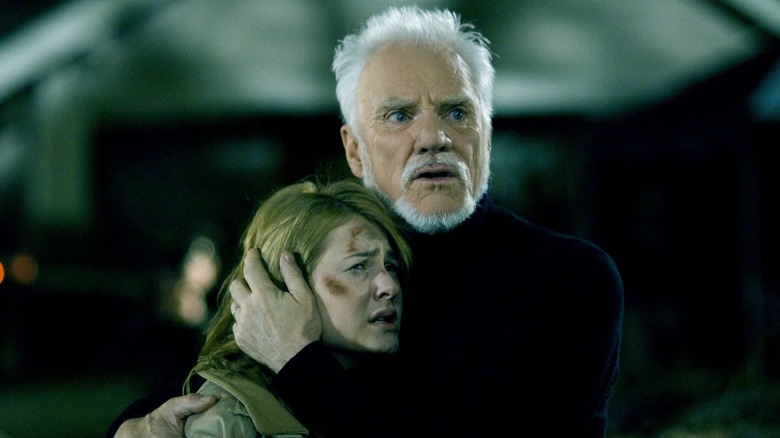The Halloween Movie Everyone Hates The Most Is Actually Good, Sorry
When I saw John Carpenter perform at NYC's Terminal 5 in November of 2017, he introduced his band's version of the "Halloween" theme with a curiously cryptic message. Before dropping the theme's iconic piano-led 5/4 beat, Carpenter simply said to the sold-out crowd: "Remember ... love never dies."
The application of that phrase to "Halloween" holds just as much ambiguity and eerie mystery as Carpenter's immortal 1978 classic does. Throughout that film, Carpenter and his co-writer and producer, Debra Hill, introduce numerous subtexts when it comes to the unknowable origin, motivations, and inner thoughts of "The Shape" aka Michael Myers; not only are there hints toward some psychosexual hang-ups he may have (including possibly seeing his female victims as facsimiles of his dead sister Judith, whom he murdered when he was a child), but the character is deliberately played by multiple actors.
About 10 years prior to that concert, Dimension Films released writer and director Rob Zombie's remake of Carpenter's film, "Halloween." It was met with an almost overwhelming amount of revulsion, as seen in its Rotten Tomatoes rating of 28 percent "Rotten" and the site's consensus that "Zombie doesn't bring many new ideas to the table" with the movie.
The "Halloween" franchise is one that fans and critics alike are continually divided on; you yourself may have seen this article's headline and thought that perhaps it refers to David Gordon Green's "Halloween Ends" from last year or Rick Rosenthal's "Halloween: Resurrection" from 2002. Today, however, we're here to discuss Zombie's "Halloween," and how it's not only an unsung triumph, but takes the original "Halloween" seriously. That approach results in Zombie bringing many new ideas and elaborations on the material to the table, including providing a little light on Carpenter's mysterious introduction.
An anti-origin story
By far, the biggest bone of contention "Halloween '07" haters have with Zombie's film is that it supposedly explains away the psychology, origin, and inner workings of Michael Myers (Tyler Mane). Certainly, it can be said that Myers is much more of a character in Zombie's film than he is in Carpenter's, and it could even be argued that Michael is the main character of the movie, being the most constant presence within it from scene to scene over the story's 15-year timespan.
For those casually watching the film (or perhaps only watching the movie's compromised theatrical cut — more on that later), it seems that Michael has the most basic origin story of any average serial killer imaginable: he was born into a broken home, his environment is filled with violently bickering family members and abusive bullies at school, he likes to torture and kill animals, he's imaginative and socially distant, and retreats into himself until he's unreachable. It makes sense why, on the surface, people balked at this over-explained origin versus the sudden, pathological snap of Michael at the beginning of Carpenter's film.
Don't forget, though, that Michael's brief "origin" in 1978's "Halloween" is intended as a "gotcha!" shocker, making the audience believe they're seeing an adult maniac on the prowl before revealing it's a little boy instead. Carpenter and Hill do, in fact, obliquely elaborate on his origin later in the film, when a graveyard caretaker describes the incident of Charlie Bowles murdering his entire family out of the blue one day to a not-paying-attention Dr. Sam Loomis (Donald Pleasence). Zombie's film compellingly elaborates on this idea, without presenting it as an end-all-be-all "explanation."
The banality of evil
It's this banality of evil, particularly its ultimate inexplicability, that Zombie tackles head-on in his "Halloween." Young Michael (played by Daeg Faerch) is already unstable when we first meet him, insisting on constantly wearing a Halloween mask and surreptitiously killing his pet rat. As the fateful events of Halloween night play out, wherein Michael murders his stepfather Ronnie (William Forsythe), sister Judith (Hanna Hall), and her boyfriend, Steve (Adam Weisman), he does so not out of passionate rage or calculated menace but casually, almost out of boredom.
As Dr. Loomis (Malcolm McDowell) spends the next 15 years attempting to reach Michael, the boy fades away the more he grows up, becoming virtually mute. Loomis, who, during his treatment of Michael, explains how black (Michael's favorite color) is actually "the absence of color," is the first to recognize how Michael is a human version of that principle. Michael's moral blankness is something Zombie demonstrates over the course of the film, as Myers kills indiscriminately with a purpose known only to him (if even that), hurting people who haven't done him any harm with as much viciousness as those who have.
It's all in the family
Another big criticism foisted upon Zombie's "Halloween" is that it merely replicates Carpenter's film in the back half. While yes, a few passages of Carpenter and Hill's dialogue are repeated, and Zombie remains very faithful to the basic spine of the story, it's ludicrous to call his "Halloween" a carbon copy.
That's because, right from the opening of the film, Zombie's movie is quintessentially his, something that's even more apparent now that he's nine features into his directing career (as opposed to when "Halloween" was released, when it was only his third film). From his debut, "House of 1000 Corpses," straight through to last year's "The Munsters," Zombie has consistently made films about families, specifically those who are strange and unusual. Some of them are loving ensembles who strain against the norms of the outside world (as with the Munsters and the Firefly family), while others, like the descendant of a witch-cursed bloodline in "The Lords of Salem," struggle with their family ties.
In "Halloween," Zombie presents both types, contrasting the rancid home environment of the Myers' with the warm and loving house provided to Michael's sister, Laurie, as she's secretly adopted by the Strodes (played by Dee Wallace and Pat Skipper). There are also the found families, as with Laurie and her sister figures, her friends Annie (Danielle Harris) and Linda (Kristina Klebe), and with Michael and his surrogate father, Loomis. Laurie can also be seen in a maternal role with her charges Tommy (Skyler Gisondo) and Lindsey (Jenny Gregg Stewart) as she protects them from Michael's attacks.
There are plenty of stylistic tics and attributes of Zombie seen throughout the film, from his colorful, crass language to numerous '70s pop culture references, but it's his theme of family that resonates strongly throughout and makes "Halloween" a Rob Zombie film more than anything.
Out of the abyss
Speaking of foul language, some detractors of the movie cite that element (along with the copious amounts of bloody gore and nudity) as something generally unfavorable when compared to Carpenter and Hill's far more classy film. Added to that is the criticism that the movie contains no so-called "likable" characters, with even the trio of high school heroines coming off as shrill and annoying.
Setting aside any defense along the lines of, "Well, that's far more realistic behavior" (seriously, have you met people before?), this approach falls neatly in line with Zombie's overall bleak tone for the film, which is an extrapolation of one of Carpenter and Hill's main themes. It's perhaps the biggest theme for the "Halloween" mythos, actually: ignorance, specifically of the dismissive and selfish variety. "Halloween" as a horror story isn't a "don't go in the old dark house" type of transgressive warning. Instead, it's a warning against complacency, that Pure Evil can manifest and attack anywhere at any time, and no small town nor average family can hope to avoid it.
To help drive that theme, Zombie presents versions of the characters who've been designed to be just a little more outrageous than their more placid '78 counterparts: Michael's family are completely caught up in their own aggressions and diversions, Laurie and her friends are arrogant teen girls, the Strodes are too loving to see Evil rushing right at them (literally, in Mr. Strode's case), and even Sheriff Brackett (Brad Dourif) believes Haddonfield is too docile a town to draw Evil back to it.
Brackett's dismissal of Loomis' warnings is entirely justified, as right from the beginning of the film, Zombie and McDowell present Loomis as a fame-seeking persona, someone who treats his job (and himself) like a rock star more than a public servant. In Carpenter's film, Loomis is the canary in the coal mine, a zealot who would be ignored at everyone's peril. In Zombie's, he's the boy who cried wolf, a selfish egotist who only recognizes his moral failings too late.
Zombie brings the slasher goods
"Forget all the subtext and the character analysis," I hear you complaining, "What about the slice-n'-dice?" Well, perhaps you've forgotten or you have yet to experience the film, but Zombie absolutely provides the spooky goods in "Halloween," too. For all the flack he caught about copying Carpenter's original, it's commendable that throughout the film's 2-hour runtime, Zombie only repeats one stalk-and-slash set piece from the 1978 film: Michael's attack on Linda and Bob (Nick Mennell). Even this repetition is a put-on, as the famous moment where Michael dresses up as a ghost (with Bob's glasses for good measure) is remixed, with Bob himself donning the costume first before being dispatched by Michael. Not for nothing, the sequence is preceded by a title card in Zombie's director's cut which reads "Trick or Treat."
While all of Michael's attacks in the film are unrelentingly brutal, Zombie provides enough jumps and suspense to make the movie (especially the last act) a roller-coaster dark ride. There are indelible moments, such as when Michael leaves a wounded but not dead Annie screaming for Laurie to turn around while she's on the phone to the police, and when Laurie, Tommy, and Lindsey are hesitant to open a bathroom door to a police officer despite knowing The Shape is lurking out there, somewhere. The climax of the film (again, in the director's cut) features not one but two extended sequences where Michael menaces Laurie, culminating in a moment that acts like a horror movie version of the nail-biting scene from "Die Hard" where McClane/Laurie are trapped in an overhead crawl space with their attackers pushing phallic objects up from below. If you are looking for pulse-pounding setpieces in your slasher films, Zombie's "Halloween" is certainly no slouch.
A tale of two versions
Of course, as I've said repeatedly throughout this article, there are two versions of Zombie's "Halloween" available, and they're very different experiences. The runtime difference between the theatrical cut and Zombie's director's cut are only about 12 minutes, but it's not just added or alternative material that makes a big difference. The odious producers and distributors Bob and Harvey Weinstein made it their specialty to recut films for release in a particular way, usually resulting in a very jittery and jarring experience. Thus, it's not like entire scenes are missing between the two cuts, but rather that little bits and bobs here and there are lost, such as a line or two of dialogue, a knife stab, and so on.
The cumulative effect this has on the theatrical cut is that the film feels far more rushed and disjointed than it should, a horrible result especially when one considers the movie's intentional brutality and abrasiveness. Like many a franchise film, Zombie's movie underwent its own post-production shuffling to begin with (there exists a not-officially-released workprint cut of the movie that features Zombie's original ending, a very different affair that can still be seen on home media releases as a deleted scene), and the cutting down of Zombie's director's cut does the movie no favors. Your mileage may vary, of course, but it's my belief that the oddly paced theatrical cut did a lot to hurt the film's reputation in the first place, so I'd advise checking the director's cut out
(As a warning, know that the director's cut includes a harrowing rape scene — another instance of surrounding Evil and perverse sexuality that awakens Michael to action — which seems to be the main reason some people prefer the theatrical cut.)
Love hurts
What of that mysterious phrase uttered by Carpenter during his concert? How can "Halloween" be any kind of love story?
Zombie certainly isn't looking to answer any of the open-ended questions in "Halloween," retaining a good deal of Carpenter and Hill's moral ambiguity in his film. What he does much more pointedly, however, is elaborate on and tie together those elements of sex and violence from the original, with Michael's views on what love is being clearly skewed from an early age. He loves his pet rat, Elvis, and yet casually murders him. His drunken stepfather openly lusts after other women (including his stepdaughter) while making abusive, violent threats toward his wife. His mother, Deborah (Sheri Moon Zombie), is a stripper who his bullies at school say will do anything for a man if the price is right. Before murdering Judith, Michael runs his fingers over her thighs, in such a way that Judith at first believes that it's her boyfriend Steve's fingers.
Through all this, Zombie demonstrates that Michael begins to equate sex and murder as two equally valid expressions of affection, and it's this perversion that permeates the entire film. Thus, a large number of Michael's victims are sexualized (the intention being that the women remind him of Judith), including Laurie: rather than Jamie Lee Curtis' far more repressed virginal Laurie in the original, Scout Taylor-Compton's Laurie openly wishes for a boyfriend at one point. It's no accident that the final scene sees Laurie triumphantly straddled atop Michael's body, "penetrating" him with a gun, an act that begins her own emotional break (one which continues in Zombie's "Halloween II"). If "Halloween" is about the encroachment of Evil into Good, then the most vulnerable and insidious corruption possible lies in the desecration of love itself. As Zombie shrewdly says via a well-timed needle drop in the film, "Love Hurts."
I love his "Halloween," and that love tends to hurt when people trash the film publicly. Hopefully, this piece might help make that love a little less painful from now on.
